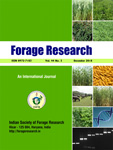PRATEEK KUMAR, DALVINDER PAL SINGH, RAKESH PUNIA, ARVIND AND PRAGATI YADAV
Department of Plant Pathology,
Department of Genetics and Plant Breeding (Forage Section),
Department of Entomology,
Department of Agronomy
CCS Haryana Agricultural University, Hisar-125 004 (Haryana), India
*(e-mail : prateekberwalhau@gmail.com)
(Received : 6 May 2024; Accepted : 26 June 2024)
SUMMARY
Cluster bean (Cyamopsis tetragonoloba L. Taub.) (2n=14) is an indigenous, self-pollinated, drought tolerant legume crop. This crop has recently gained the status of industrial crop due to the high galactomannan content in the endosperm of its seed. This crop is vulnerable to bacterial leaf blight as one of the most destructive diseases of cluster bean caused by Xanthomonas axonopodis pv. cyamopsidis and confines cluster bean productivity in all growing regions. Biological control is an ecological-friendly approach to suppress the growth of phytopathogens. In this study, four bio- agents viz. Bacillus subtilis, Providencia sp., Trichoderma viride and Trichoderma harzianum were evaluated against Xanthomonas axonopodis pv. cyamopsidis in vitro condition. Providencia sp. showed maximum antibacterial activity with 14.12 per cent zone inhibition followed by Bacillus subtilis (12.13%). The fungal antagonists viz. Trichoderma viride (7.11%) and Trichoderma harzianum (5.95%), were found least effective against the tested pathogen. Providencia sp.@ 25 per cent w/v reduce disease incidence of 50 per cent under screen house conditions followed by Bacillus subtilis (35.71%). Among the treatments, the lowest disease reduction and highest per cent disease incidence was observed in treatment with Trichoderma harzianum (7.14). Therefore, bioagents can be used as a sustainable tool for management of plant diseases towards sustainable agriculture.
Key words: Biocontrol, Providencia, Bacillus subtilis, Trichoderma viride, Xanthomonas axonopodis pv. cyamopsidis, Bacterial blight

